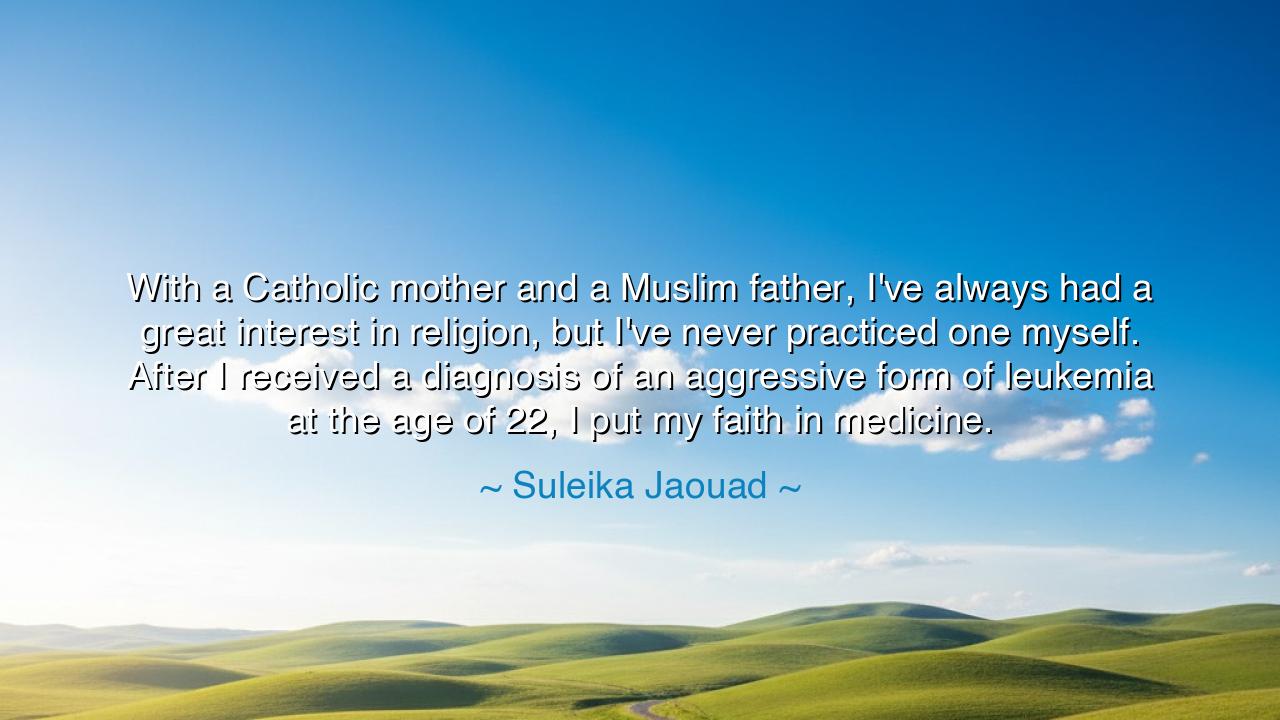
With a Catholic mother and a Muslim father, I've always had a
With a Catholic mother and a Muslim father, I've always had a great interest in religion, but I've never practiced one myself. After I received a diagnosis of an aggressive form of leukemia at the age of 22, I put my faith in medicine.






"With a Catholic mother and a Muslim father, I've always had a great interest in religion, but I've never practiced one myself. After I received a diagnosis of an aggressive form of leukemia at the age of 22, I put my faith in medicine." These words, spoken by Suleika Jaouad, reflect a profound journey of self-discovery and understanding, a journey that intertwines the complexity of faith with the stark reality of human suffering. In a world shaped by diverse religions and beliefs, Jaouad’s story is one of seeking understanding, navigating the spaces between different worldviews, and ultimately turning to the tangible, to the healing powers of medicine, when confronted with the most vulnerable of human experiences—illness.
From an early age, Jaouad was exposed to two powerful and distinct religions—Catholicism through her mother, and Islam through her father. In these two faiths, she found beauty, depth, and complexity, yet she never fully embraced one over the other. This tension, this intersection of faiths, likely sparked within her a great curiosity about the nature of belief and spirituality. As the ancient philosophers would ask: what is the essence of faith? Is it something to be inherited through tradition, or something to be discovered through personal experience and reflection? Socrates spoke often of the need for personal reflection and the pursuit of truth, a journey that does not rely on inherited doctrines alone, but on the wisdom born of personal questioning and experience.
But Jaouad’s journey into faith took a different turn when she faced the life-altering diagnosis of leukemia at the age of 22. It is in the face of such overwhelming uncertainty—a moment when the fragility of life becomes painfully clear—that the question of faith takes on new meaning. Faith in medicine, in the scientific advances and treatments that could save her life, became her guiding light. The ancient world, though rich in spiritual beliefs, also revered the practical wisdom of medicine and healing. In the ancient Greek world, the god Asclepius was worshipped as the god of medicine and healing, representing the understanding that healing is both an art and a science. Jaouad’s decision to place her faith in medicine reflects a modern continuation of this ancient belief: that medicine is not opposed to faith, but rather a form of healing that engages both the body and the mind.
Let us turn, O children, to the example of Hippocrates, the father of modern medicine, whose oath still guides medical practitioners today. Hippocrates, though steeped in the philosophy of his time, understood that true healing requires not just a spiritual understanding of the body, but a deep knowledge of its workings and the treatments available. The ancients did not see faith in medicine as separate from their spiritual lives; rather, they viewed it as a tool to engage with the divine order of the body and the universe. Jaouad’s trust in medicine—in the tangible power of modern healthcare—can be seen as a continuation of this ancient understanding: that medicine and faith need not be in opposition but can complement each other in the quest for health and wholeness.
Jaouad’s decision to place her faith in medicine during her battle with leukemia also reflects a deeper truth about the human condition: faith often evolves when we face life’s hardest trials. In our youth, we may seek meaning through religion, through the inherited beliefs of our parents or society, but when faced with suffering, we often must confront our mortality and the limits of what we can control. Faith in science, in the healing power of medicine, becomes not just an intellectual choice, but a desperate hope, a plea for life, a means to survive. This is not to dismiss religion or spirituality, but to acknowledge that when we are confronted with suffering, our faith often shifts toward that which offers the most direct solution.
And yet, there is a profound lesson here for all of us: the balance between faith in the seen and unseen, the spiritual and the scientific, is essential. Just as Jaouad found herself at a crossroads between the wisdom of her parents’ religions and the practical, life-saving potential of modern medicine, we too must recognize that faith is not a one-size-fits-all concept. It is something that evolves with our experiences. We must trust in the tools available to us, whether they are spiritual or scientific, but also remain open-minded, allowing faith to grow and shift with our circumstances. The faith that heals may come in many forms—religion, medicine, community, or even the quiet resilience of the human spirit.
So, O children, let us embrace faith in all its forms. As Suleika Jaouad teaches us, faith is not confined to one path, one belief, or one practice. It can take many forms, shifting with the challenges of life, and evolving as we navigate the complexities of the world. Whether in the face of illness, adversity, or joy, faith—in both medicine and spirituality—can be a guiding light. Let us learn from Jaouad's story: that sometimes, the most powerful form of faith is not a belief in a single tradition, but a belief in the strength of both the human body and spirit, and in the resources that help them thrive. In this, we can find healing, growth, and peace.






AAdministratorAdministrator
Welcome, honored guests. Please leave a comment, we will respond soon